Space
Sign up for our newsletter
We summarize the week's scientific breakthroughs every Thursday.
-
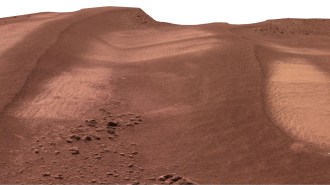 Space
SpaceSalty water may have flowed near Mars’ equator as recently as 400,000 years ago
Crusts and cracks on Martian sand dunes are a sign salty water flowed near the equator thousands, not billions, of years ago — and may still exist.
-
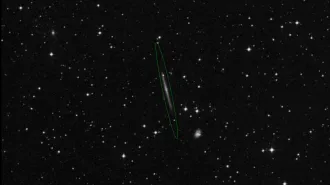 Astronomy
AstronomyA streak of light may not be a black hole fleeing its galaxy after all
A suspicious trail of starlight may just be a spiral galaxy seen edge on, not stars that formed in the wake of a runaway supermassive black hole.
By Liz Kruesi -
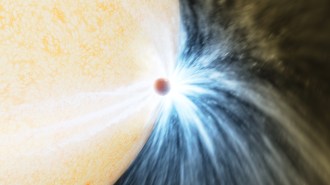 Astronomy
AstronomyFor the first time, astrophysicists have caught a star eating a planet
A burst of light and a cloud of dust are signs that a star 12,000 light-years away swallowed a planet up to 10 times the mass of Jupiter.
-
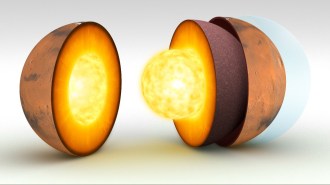 Planetary Science
Planetary ScienceSeismic waves crossing Mars’ core reveal details of the Red Planet’s heart
NASA’s InSight lander observed a quake and an impact on the farside of Mars, allowing researchers to measure physical properties of the planet’s core.
By Nikk Ogasa -
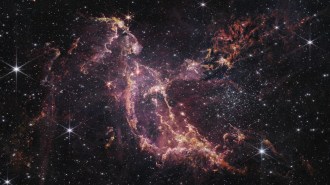 Space
SpaceRocky planets might have been able to form in the early universe
The James Webb telescope spied planet-building material around young stars in a nearby galaxy whose chemical makeup matches that of the early cosmos.
-
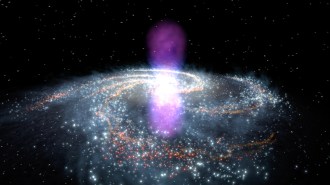 Astronomy
AstronomyCosmic antimatter hints at origins of huge bubbles in our galaxy’s center
An excess of positrons in Earth’s vicinity supports the idea that the Fermi bubbles were burped by the Milky Way’s supermassive black hole long ago.
-
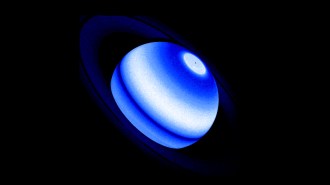 Planetary Science
Planetary ScienceSaturn’s icy rings are probably heating its atmosphere, giving it an ultraviolet glow
Detecting similar emission from a distant world could help astronomers find other planets that boast bright and beautiful rings.
By Ken Croswell -
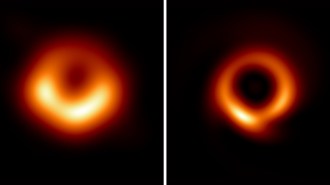 Astronomy
AstronomyThe first black hole portrait got sharper thanks to machine learning
A machine learning technique filled in data gaps in the image of M87’s black hole, resulting in a thinner ring.
-
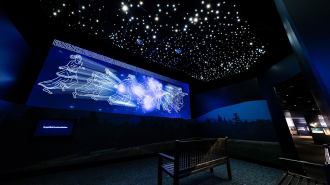 Science & Society
Science & SocietyThe Smithsonian’s ‘Lights Out’ inspires visitors to save the fading night sky
The exhibition examines how light pollution harms astronomy, ecosystems and human cultures. But it also offers hope.
-
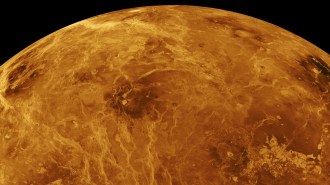 Planetary Science
Planetary ScienceVenus has almost 50 times as many volcanoes as previously thought
Where are there NOT volcanoes on Venus? A new map of the planet unveils a veritable volcanic bonanza.
-
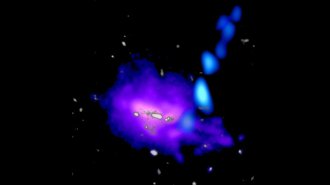 Astronomy
AstronomyA stream of cold gas is unexpectedly feeding the far-off Anthill Galaxy
The finding suggests that early galaxies might have gained more of their bulk from streams of cold gas instead of in violent galaxy collisions.
-
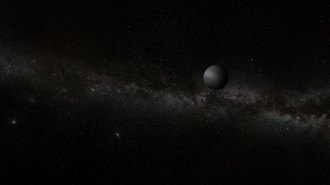 Planetary Science
Planetary SciencePlanets without stars might have moons suitable for life
Thanks to gravitational squeezing by their host planets, some moons of rogue planets could stay warm for over a billion years, simulations suggest.
By Bas den Hond